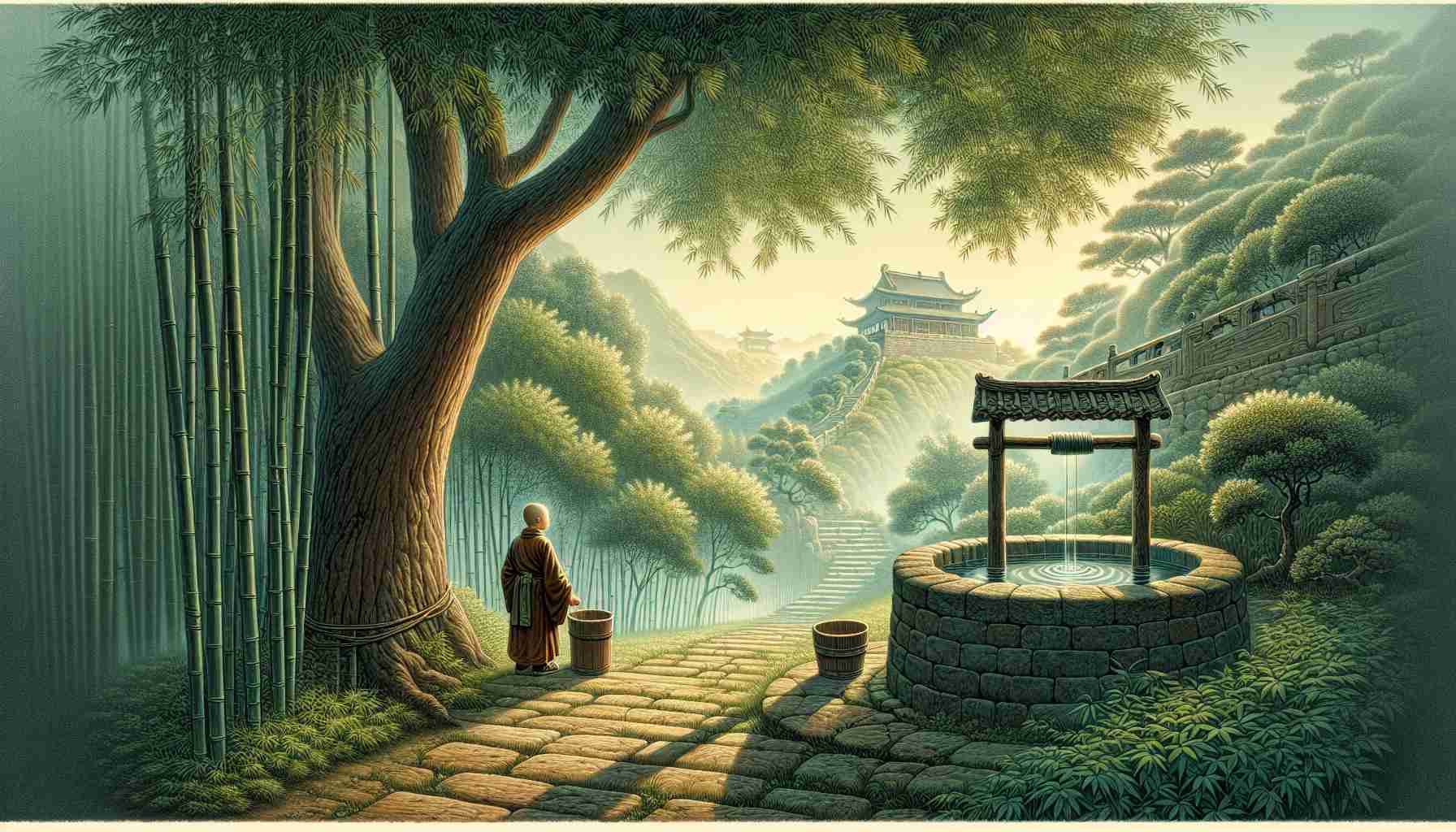

The rain had just ended, and the air smelled like fresh earth. I was wiping the dew off my sandals when Master Han called my name. “Liang,” he said, “we need more water for the tea.” I bowed and picked up the wooden bucket, trying not to sigh too loudly. The well was at the bottom of the hill, and I had already fetched water twice this morning.
As I walked down the winding path, I looked at the trees. They didn’t work hard to grow. They didn’t push or hurry. Yet every season, they changed and grew just right.
That thought felt strange. I had always been told to work hard, to never stop moving, to always try my best. But lately, I was tired. No matter how hard I worked, someone always wanted more. I was the youngest monk in our little temple, and my legs always ached by midday.
At the bottom of the hill, I stopped at the well and looked up at the sky. Sunlight broke through the clouds, lighting up the mountaintop. I closed my eyes and listened. The wind played with the leaves, birds chirped softly, and water dripped gently from the bucket’s edge.
That’s when I remembered the story Master Han once told us during evening tea. It was from the old book, the Tao Te Ching, written by a man named Laozi, who lived over two thousand years ago. Laozi was a quiet teacher who believed in something called the Tao. It means “The Way.” He said that rulers who lead best are the ones people hardly notice. They don’t shout, they don’t show off—they just guide quietly, like the wind or water.
At first, I didn’t understand that story. How could someone lead by doing nothing? It made no sense.
But now, standing at the well, I began to see. The trees didn't shout to grow. The water didn’t argue with the stones. They just did what they were meant to do—gently, naturally. That was what Laozi meant by “Wu Wei,” or effortless action.
I filled the bucket, this time without rushing. I didn’t need to run up the hill to prove anything. I just walked, step after step, letting the path guide me instead of forcing my way.
When I got back, Master Han looked up from his book and smiled. “Took your time?”
“Yes,” I said, smiling back. “But I saw something important along the way.”
We didn’t speak about it again, but I knew he understood.
That day, I learned that working harder wasn’t always the answer. Sometimes, doing less and being still helped more. Like the rain that feeds the earth without trying, or the wind that brings cool air without a sound.
And even now, as I grow older, I still remember that walk to the well. It taught me that the gentle way—the Way of the Tao—is often the strongest path of all.
The rain had just ended, and the air smelled like fresh earth. I was wiping the dew off my sandals when Master Han called my name. “Liang,” he said, “we need more water for the tea.” I bowed and picked up the wooden bucket, trying not to sigh too loudly. The well was at the bottom of the hill, and I had already fetched water twice this morning.
As I walked down the winding path, I looked at the trees. They didn’t work hard to grow. They didn’t push or hurry. Yet every season, they changed and grew just right.
That thought felt strange. I had always been told to work hard, to never stop moving, to always try my best. But lately, I was tired. No matter how hard I worked, someone always wanted more. I was the youngest monk in our little temple, and my legs always ached by midday.
At the bottom of the hill, I stopped at the well and looked up at the sky. Sunlight broke through the clouds, lighting up the mountaintop. I closed my eyes and listened. The wind played with the leaves, birds chirped softly, and water dripped gently from the bucket’s edge.
That’s when I remembered the story Master Han once told us during evening tea. It was from the old book, the Tao Te Ching, written by a man named Laozi, who lived over two thousand years ago. Laozi was a quiet teacher who believed in something called the Tao. It means “The Way.” He said that rulers who lead best are the ones people hardly notice. They don’t shout, they don’t show off—they just guide quietly, like the wind or water.
At first, I didn’t understand that story. How could someone lead by doing nothing? It made no sense.
But now, standing at the well, I began to see. The trees didn't shout to grow. The water didn’t argue with the stones. They just did what they were meant to do—gently, naturally. That was what Laozi meant by “Wu Wei,” or effortless action.
I filled the bucket, this time without rushing. I didn’t need to run up the hill to prove anything. I just walked, step after step, letting the path guide me instead of forcing my way.
When I got back, Master Han looked up from his book and smiled. “Took your time?”
“Yes,” I said, smiling back. “But I saw something important along the way.”
We didn’t speak about it again, but I knew he understood.
That day, I learned that working harder wasn’t always the answer. Sometimes, doing less and being still helped more. Like the rain that feeds the earth without trying, or the wind that brings cool air without a sound.
And even now, as I grow older, I still remember that walk to the well. It taught me that the gentle way—the Way of the Tao—is often the strongest path of all.